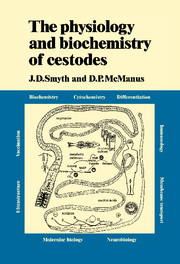Book contents
- Frontmatter
- Contents
- Preface
- Acknowledgements
- 1 The cestodes: general considerations
- 2 The adult cestode: special structural features relevant to its physiology
- 3 The adult cestode in its environment
- 4 The adult: general metabolism and chemical composition; lipid metabolism
- 5 The adult: carbohydrate metabolism
- 6 The adult: proteins and nucleic acids
- 7 The biology of the egg
- 8 Developmental biology of larvae
- 9 Development within definitive host
- 10 Cultivation of cestodes in vitro
- 11 Immunobiology of cestodes
- References
- Index
4 - The adult: general metabolism and chemical composition; lipid metabolism
Published online by Cambridge University Press: 24 November 2009
- Frontmatter
- Contents
- Preface
- Acknowledgements
- 1 The cestodes: general considerations
- 2 The adult cestode: special structural features relevant to its physiology
- 3 The adult cestode in its environment
- 4 The adult: general metabolism and chemical composition; lipid metabolism
- 5 The adult: carbohydrate metabolism
- 6 The adult: proteins and nucleic acids
- 7 The biology of the egg
- 8 Developmental biology of larvae
- 9 Development within definitive host
- 10 Cultivation of cestodes in vitro
- 11 Immunobiology of cestodes
- References
- Index
Summary
General background
Basic problems
Metabolic studies on cestodes present a number of challenging problems. A basic difficulty is to relate results from studies carried out in vitro to the processes which actually occur in vivo. Cestodes, with their complex tegumental transport mechanisms (Chapters 5 and 6), are in a state of dynamic equilibrium with their hosts, and removal from the host environment tends to destroy this balance. The most favourable in vitro culture conditions (Chapter 10) can partially mimic some of the complicated interactions which occur between host and parasite, but, nevertheless, it is clear that most metabolic experiments with cestodes in vitro take place under suboptimal, unphysiological conditions. Many (but not all) parasite biochemists are aware of these limitations and appreciate that these artificial systems produce data which must ultimately be tested in vivo, although the technical problems involved in such studies may prove difficult, if not insurmountable.
Another well-recognised complication in the study of cestode metabolism is the fact that a number of species (e.g. Echinococcus granulosus, Hymenolepis diminuta, Taenia crassiceps) have now been shown to exist as complexes of different strains, which may, often quite considerably, differ in their biochemistry. This important aspect is considered, in depth, in Chapters 5, 6 and 10. Furthermore, there is evidence that parasites from different host species or different strains of host show differences in metabolism, and the sex and circadian rhythm of the host can also influence the biochemistry of the parasite under study (39).
- Type
- Chapter
- Information
- The Physiology and Biochemistry of Cestodes , pp. 53 - 76Publisher: Cambridge University PressPrint publication year: 1989
- 6
- Cited by



